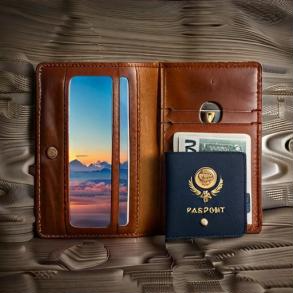Do passport wallets need RFID protection?
Passport Wallets: Do They Really Need Secret Spy Protection?
You finally saved up enough babysitting money for a trip to Europe with your best friend! You’re super excited to visit Big Ben in London and see the Eiffel Tower in Paris. But wait – you just realized you need a passport wallet to safely carry your passport, money, and other important stuff while traveling. Passport wallets are handy for keeping all your travel documents in one place. But here’s a question to think about: should your passport wallet have secret spy technology built into it? Let’s investigate!

What in the World is RFID?
To understand if you need a “spy” passport wallet, you first need to know what RFID is. RFID stands for Radio Frequency Identification. It’s a technology that uses tiny computer chips and mini antennas to track objects. RFID chips are hidden in many everyday items like credit cards, store merchandise, library books, passports, and more!
The chips are really small – smaller than a speck of glitter. They quietly send out radio waves that can be picked up by special RFID readers. It’s like each item has its own radio station giving out secret information! RFID helps stores and organizations quickly scan items to track inventory and purchases.
But here’s the catch: RFID chips don’t require close contact. The radio waves can be intercepted from a short distance away. So someone walking by with an RFID reader in their backpack could secretly scan the chip in your passport to steal personal information! It’s like they’re tuning into your passport’s radio station. Crazy, right?

How Spy Wallets Stop Sneaky Scanning
To prevent sneaky RFID scanning, some companies make passport wallets with material that blocks radio waves. It’s like building a secret bunker so no signals can get in or out! This stops strangers from secretly tuning into your passport’s radio frequency and stealing the data.
Blocking material can be made into the lining of special “RFID-blocking” wallets. It keeps all the info on your RFID chips safe when the wallet is closed. Who knew you could have spy-worthy gear just like a secret agent!
But are shielded passport wallets really necessary? Or are they just excessive spy gadgets? Let’s weigh some pros and cons.

To Block or Not to Block RFID – That is the Question
Pros:
- Blocks strangers from scanning your passport, credit cards, etc. and stealing personal information. We all want to avoid identity theft if we can!
- Provides an extra layer of security while traveling, especially on public transportation where scanning attempts are more likely.
- Gives you peace of mind knowing your info is protected. Travel already causes enough stress, so having one less thing to worry about is nice.
- Most RFID-blocking material still allows low frequency signals to pass through, like the NFC chip used by your smartphone. So you don’t have to remove your phone from the wallet for it to work!
Cons:
- RFID scanning of passports and credit cards doesn’t happen frequently enough to require special wallets. Identity theft more often occurs due to major data breaches, not individual scanning.
- RFID protection materials can vary in quality. Some might not fully block signals, so paying more doesn’t guarantee better results.
- As technology advances, hacking methods could evolve to bypass RFID blocking. So the protection might become outdated.
- Adding RFID shielding can increase the wallet price. You have to decide if it’s worth the extra cost.
- It’s one more thing to have to remove at airport security checkpoints. Some travelers don’t want the hassle.
To Block or Not to Block? A Traveler’s Decision
Whether to use RFID-blocking gear comes down to your specific situation. If you rarely travel abroad, maybe regular wallets work fine for you. But if you’re a frequent world explorer visiting packed cities, you might want the extra precaution.
If you’re buying a higher-end designer wallet and don’t mind paying more, it could be worth getting RFID protection built in. But for an inexpensive nylon wallet, it probably isn’t necessary.
You also have to consider your destinations. Some countries require passports to have RFID chips. Others don’t use RFID technology at all. Research the place you’re traveling so you understand any risks and laws.
The most important thing is keeping your personal information secure. But you also want wallets that are affordable and easy to use. So weigh the pros and cons carefully to decide what fits your travel and budget needs.

Stay Protected as Sneaky Technology Advances
RFID technology will continue to evolve. What protects your data today might not work tomorrow! Companies will have to keep adapting passport wallets and materials as hacking techniques become more advanced.
Laws and rules about scanning technology also vary around the world. Some places might require security features that others ban. Make sure to research the latest country-specific requirements before you travel.
While RFID skimming isn’t extremely common now, it could increase as more items contain embedded chips. Stay curious about changes in technology and security. Pay attention to the latest recommendations so you can keep your info as safe as possible while traveling!
The world is full of amazing places to explore. With the right passport wallet for your needs, you can securely carry your important documents on your journey. Bon voyage!
Next Up
RFID Protection Unveiled: Are Your Leather Wallets Shielded?
